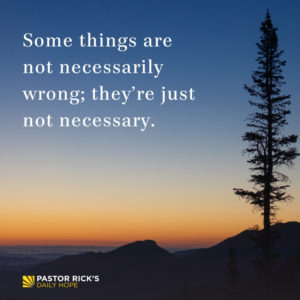Rick Warren's Blog, page 445
May 26, 2019
How Will Your Decision Affect Others?

One of the biggest mistakes we make in life is forgetting how much our actions influence the people around us. Every day you are tempted to make decisions that may seem best for you but could have a devastating effect on the people around you. If you want to make wise decisions, you need to ask, “Will my choice harm other people?”
That’s the opposite of our culture. Our society teaches us to think only of ourselves. But God wants you to think about others, not just yourself. In fact, the Bible says that one day you’re going to be judged by God on how your decisions affected other people.
Romans 14:12-13 says, “Each of us will give an account of himself to God. So don’t criticize each other anymore. Try instead to live in such a way that you will never make your brother stumble by letting him see you doing something that he thinks is wrong” (TLB).
You may not like hearing this, but you are being watched—all the time. If you’re a parent, you should be especially aware that little eyes are always observing. You’ve got to be careful about what you say and do because you’re influencing not just your life but the next generation as well.
Show respect for authority. If a police officer pulls you over for a ticket, even if you think he’s wrong, you treat him with respect.
Don’t call in sick when your family is actually going to the beach for the day.
Don’t bring supplies home that you stole from the office to use for personal benefit.
Don’t cheat on your taxes—and then brag in front of your kids about all the ways you’re ripping off Uncle Sam.
Don’t watch the awful stuff that’s on TV and in the movies with your kids. Think about whether you should be watching it at all.
Mature people limit their freedom for the benefit of others. Not because you’re afraid of what other people think, but because you’re motivated by love. In situations where there is no clear right or wrong, you have to ask yourself, “How will my decision affect other people?”
The post How Will Your Decision Affect Others? appeared first on Pastor Rick's Daily Hope.
¿Cómo Afectará tu Decisión a los Demás?

“Cada uno de nosotros tendrá que responder por sí mismo ante Dios. Así que dejemos de juzgarnos unos a otros. Por el contrario, propónganse vivir de tal manera que no causen tropiezo ni caída a otro creyente” (Romanos 14:12-13 NTV).
Uno de los errores más grandes que cometemos en la vida es olvidar cuánto influyen nuestras acciones en las personas que nos rodean. Todos los días estás tentado a tomar decisiones que pueden parecerte las mejores, pero que pueden tener un efecto devastador en las personas que te rodean. Si desea tomar decisiones sabias, debes preguntarte: “¿Mi elección perjudicará a otras personas?”
Eso es lo contrario de nuestra cultura. Nuestra sociedad nos enseña a pensar solo en nosotros mismos. Pero Dios quiere que pienses en los demás, no solo en ti mismo. De hecho, la Biblia dice que un día Dios te juzgará por cómo tus decisiones afectaron a otras personas.
Romanos 14:12-13 dice: “Cada uno de nosotros tendrá que responder por sí mismo ante Dios. Así que dejemos de juzgarnos unos a otros. Por el contrario, propónganse vivir de tal manera que no causen tropiezo ni caída a otro creyente” (NTV).
Puede que no te guste escuchar esto, pero te están observando. Si eres un padre, debes ser especialmente consciente de que los pequeños ojos siempre están observando. Debes tener cuidado con lo que dices y haces, porque estás influyendo no solo en tu vida sino también en la próxima generación.
Mostrar respeto por la autoridad. Si un oficial de policía te detiene por una infracción, incluso si crees que está equivocado, lo tratas con respeto.
No llames enfermo al trabajo cuando tu familia realmente va a la playa por el día.
No lleves artículos a tu casa que robaste de la oficina para usarlos en beneficio personal.
No hagas trampa en tus impuestos y luego presumir frente a tus hijos sobre todas las formas en que estás estafando al estado.
No mires las cosas horribles que se ven en la televisión y en las películas con tus hijos. Piensa si deberías estar observándolo o no.
Las personas maduras limitan su libertad en beneficio de los demás. No porque tengas miedo de lo que piensan los demás, sino porque estás motivado por el amor. En situaciones donde no hay un claro o correcto error, debe preguntarse: “¿Cómo afectará mi decisión a otras personas?”
Reflexiona sobre esto:
¿Cómo afecta el orgullo a tu capacidad de considerar claramente cómo afectan tus decisiones a otras personas?
¿Importa si la otra persona piensa que lo que estás haciendo está mal, incluso si crees que está bien? ¿Por qué o por qué no?
Hablando en términos prácticos, ¿qué significa limitar tu libertad en beneficio de los demás?
The post ¿Cómo Afectará tu Decisión a los Demás? appeared first on Pastor Rick's Daily Hope.
May 25, 2019
Decide por lo Mejor, no solo lo que es Bueno

“‘«Todo está permitido», pero no todo es provechoso. «Todo está permitido», pero no todo es constructivo” (1 Corintios 10:23 NVI).
Algunas cosas no están necesariamente mal; simplemente no son necesarias. La mayoría de las elecciones que haces en la vida no son realmente una cuestión entre lo bueno y lo malo. Son más una cuestión de lo que es mejor para ti.
La Biblia habla de esto en 1 Corintios 10:23: “«Todo está permitido», pero no todo es provechoso. «Todo está permitido», pero no todo es constructivo” (NVI).
Algunas cosas son moralmente neutrales. Para tomar una buena decisión, debe ir a un estándar más alto y preguntar: “¿Me convertiré en una mejor persona por lo que voy a hacer?” Eso se llama prueba para mejorar.
Recuerdo que hace muchos años, cuando Kay estaba amamantando a nuestro bebé, que siempre tenía hambre al mediodía, por lo que se sentaba para alimentar al bebé y encender el televisor. ¿Qué hay en la televisión al mediodía? Telenovelas. Así que comenzó a ver una telenovela mientras alimentaba al bebé. Evidentemente, las telenovelas se topan entre sí. Una lleva directamente a la siguiente. Muy pronto ella estaba viendo dos espectáculos, y luego tres. ¡Es mucho tiempo para que un bebé siga alimentándose!
Después de un tiempo, dijo que se dio cuenta de que ya no estaba haciendo esto por los bebés. En realidad, estaba reorganizando su agenda para asegurarse de poder ver esos programas. Comenzaba a pensar: “Plancharé ahora” o “Limpiaré la cocina” y se aseguraría de que estuviera cerca de la televisión.
De repente, te conectas con la vida de los personajes de ficción. ¡Te interesaste íntimamente en la vida de las personas que ni siquiera existían! Entonces un día la golpeó como una tonelada de ladrillos: “¡Estoy perdiendo mi vida! Esto no me hace una mejor mujer o madre o esposa. No tiene valor redentor. Podría preocuparme por las personas que existen”.
¿Estás más interesado en personas ficticias en la televisión que en Pablo, Pedro y los discípulos y lo que Dios quiere hacer en tu vida? ¿Inviertes tu tiempo en la vida superficial de las personas que llenan las revistas de celebridades? ¿Estás pegado a ESPN desde el momento en que llegas a casa el viernes hasta el lunes por la mañana?
¿Son estas cosas malas? No. ¿Son malos? No. Pero la pregunta no es: “¿Hay algo malo en esto?” La pregunta es: “¿Me hará más como Jesús?”
Reflexiona sobre esto:
¿Cuáles son algunas actividades o hábitos que no son malos pero que no son lo mejor de Dios para ti?
¿Con qué puedes reemplazar esas cosas que te ayudarán a crecer como un seguidor de Cristo?
¿Tu idea de lo que es mejor es lo que te ayuda a ser más como Jesús?
The post Decide por lo Mejor, no solo lo que es Bueno appeared first on Pastor Rick's Daily Hope.
Decide What’s Best, Not Just What’s Good

Some things are not necessarily wrong; they’re just not necessary. Most choices you make in life are not really a matter between good and bad. They’re more a matter of what’s best for you.
The Bible talks about this in 1 Corinthians 10:23: “‘I have the right to do anything,’ you say—but not everything is beneficial. ‘I have the right to do anything’—but not everything is constructive” (NIV).
Some things are morally neutral. To make a good decision, you need to go to a higher standard and ask, “Will I become a better person because of what I’m about to do?” That’s called the improvement test.
I remember many years ago when Kay was nursing our baby, who always got hungry about noon, so she would sit down to feed the baby and turn on the TV. What’s on TV at midday? Soap operas. So she started watching a soap opera as she fed the baby. Evidently, soap operas run into each other. One leads right into the next one. Pretty soon she was watching two shows, and then three. That’s a long time for a baby to keep getting fed!
After a while she said she realized she wasn’t doing this for the babies anymore. She was actually rearranging her schedule to make sure she could see those shows. She’d start thinking, “I’ll do ironing right now” or “I’ll clean up the kitchen,” and she’d make sure she was near the TV.
Suddenly she got connected to the lives of fictional characters. She became intimately interested in the lives of people who didn’t even exist! Then one day it hit her like a ton of bricks: “I am wasting my life! This does not make me a better woman or mother or wife. It has no redeeming value. I could be caring about people who do exist.”
Are you more interested in fictional people on TV than you are in Paul and Peter and the disciples and what God wants to do in your life? Do you invest your time in the shallow lives of people who fill celebrity magazines? Are you glued to ESPN from the moment you get home on Friday until Monday morning?
Are these things evil? No. Are they bad? No. But the question is not, “Is there anything wrong with it?” The question is, “Will it make me more like Jesus?”
The post Decide What’s Best, Not Just What’s Good appeared first on Pastor Rick's Daily Hope.
May 24, 2019
¿Qué Pasa cuando Haces lo que Sabes que está Mal?

“Quien se conduce con integridad anda seguro; quien anda en malos pasos será descubierto” (Proverbios 10:9 NVI).
La Biblia dice en Proverbios 10:9, “Quien se conduce con integridad anda seguro; quien anda en malos pasos será descubierto” (NVI). ¡Serás descubierto! Así que, cuando tomes decisiones, necesitas la prueba de integridad.
La prueba de integridad consiste en que tu vida pública y tu vida privada concuerden –lo que está en tu corazón y lo que está en tu vida, sean la misma cosa. Pregúntate: “¿Quisiera que todos supieran sobre esta decisión que estoy tomando?”. La verdad es, cuando se trata de integridad, aun cuando engañas a todos, no te puedes engañar a ti mismo. Y si violas tu propia consciencia, tienes que pagar por ello.
Algunas veces sabemos que estamos a punto de hacer lo incorrecto. Sabemos que no deberíamos hacerlo, pero este pensamiento viene a nuestra mente: “Yo sé que estoy haciendo algo incorrecto, pero lo haré de todas formas porque sé que Dios es un Dios perdonador”
¿Crees que puedes hacer algo que Dios dice que está mal y no sufrir las consecuencias en tu vida? Esa es la única razón por la que él no quiere que tomes esa decisión –porque él te ama, no porque él quiera evitar que te diviertas. Dios sabe que hay consecuencias para cada decisión. Él conoce que cada mala decisión deja una cicatriz en tu vida. Y quiere lo mejor para ti.
¿Esto significa que Dios no nos perdona por las cosas malas que hacemos? Por supuesto que él nos perdona. Él es un Dios perdonador y clemente. Pero el perdón no nos libra del dolor y de las consecuencias que vienen a partir de las malas decisiones. Puedes ser perdonado y aún tener arrepentimientos. Puedes ser perdonado y todavía enfrentar el dolor. Puedes ser perdonado y todavía tener relaciones rotas.
Romanos 14:14, dice “… pero si alguien piensa que algo es impuro, lo es para él” (TLA). Este versículo simplemente dice que cuando tengamos duda, no lo hagamos. Es una violación de la prueba de integridad. Lo que no proviene de la fe en nuestra vida, es pecado.
Reflexiona sobre esto :
¿Cómo se afecta tu integridad cuando sabes hacer lo correcto, pero no lo haces?
¿Por qué el juego de la comparación es tan peligroso cuando se trata de integridad? ¿Cómo aplicas Romanos 14:14?
The post ¿Qué Pasa cuando Haces lo que Sabes que está Mal? appeared first on Pastor Rick's Daily Hope.
What Happens When You Do What You Know Is Wrong?

The Bible says in Proverbs 10:9, “Whoever walks in integrity walks securely, but whoever takes crooked paths will be found out” (NIV). You will be found out! So when making decisions, you need the integrity test.
The test of integrity is that your public life and your private life match—what’s in your heart and what’s in your life are the same thing. You ask yourself, “Would I want everyone to know about this decision that I’m making?” The truth is, when it comes to integrity, even if you can fool everyone else, you can’t fool yourself. And if you violate your own conscience, you have to pay for that.
Sometimes we know we’re about to do the wrong thing. We know we shouldn’t do it, but this thought comes to our mind: “I know I’m doing the wrong thing, but I’m going to go ahead and do it because I know God is a forgiving God.”
Do you think you can do something that God says is wrong and not have consequences in your life? That’s the very reason he doesn’t want you to make that decision—because he loves you, not because he wants to keep you from having fun. God knows there are consequences to every decision. He knows every bad decision leaves scars in your life. And he wants better for you.
Does this mean that God does not forgive us for the wrong things we do? Of course he forgives us. He’s a forgiving and gracious God. But that forgiveness does not free us from the pain and the consequences that come from bad decisions. You can be forgiven and still have regrets. You can be forgiven and still face pain. You can be forgiven and still have a broken relationship.
Romans 14:14 says, “If someone believes it is wrong, then he shouldn’t do it because for him it is wrong” (TLB). This verse simply says that when in doubt, don’t. It’s a violation of the integrity test. Whatever is not from faith in our lives is sin.
The post What Happens When You Do What You Know Is Wrong? appeared first on Pastor Rick's Daily Hope.
May 23, 2019
Good Decisions Always Agree with God’s Word

When you need to make a decision, the first and ideal test is this: “Is my decision in harmony with God’s Word?”
You have to decide what’s going to be your ultimate authority in life. It really boils down to this choice: God’s Word or the world. Are you going to base your decisions on what God says or what other people say?
If you base your life on popular opinion, you’re always going to be out of date, because it changes every day. What was “in” yesterday will not be “in” today, and what’s “in” today will not be “in” tomorrow. If you base your life on popular culture, political correctness, or opinion polls, you will struggle because you’re building on a shifting foundation!
On the other hand, if you base your life on God’s Word, the truth never changes. Truth is always true. So if God says something was wrong 10,000 years ago, it was also wrong 500 years ago, it’s wrong today, and it will be wrong 1,000 years from today. I don’t care what opinion polls and political correctness and the media say. If God says it’s wrong, it’s wrong. It always has been, and it always will be. If God says it’s right, it will always be right. That is a solid foundation!
God has set up the universe with certain laws—physical, moral, and spiritual. God built the universe around these laws because they’re all for your benefit. When you cooperate with the principles in this universe, you succeed. If you reject, disobey, ignore, and rebel against God’s principles, you’re the one who gets hurt.
You don’t ever break God’s laws. They break you! If I go up on top of a building and jump off, I don’t break the law of gravity. It breaks me. The same is true with moral laws and spiritual laws. You cannot just thumb your nose at God and get away with it. There’s inevitably a reckoning. Anytime you violate God’s principles, you’re asking for trouble.
With all this in mind, you can be confident in your decision. If God says it’s okay, then you do it. If God says no, then you don’t do it.
“Your word is a lamp for my feet, a light on my path” (Psalm 119:105 NIV).
The post Good Decisions Always Agree with God’s Word appeared first on Pastor Rick's Daily Hope.
Las Buenas Decisiones siempre están de Acuerdo con la Palabra de Dios

“Tu palabra es una lámpara a mis pies; es una luz en mi sendero” (Salmo 119:105 NVI).
Cuando necesitas tomar una decisión, la primera prueba ideal es esta: “¿Mi decisión está en armonía con la Palabra de Dios?”
Tienes que decidir quién va a ser tu máxima autoridad en la vida. Realmente se reduce a esta elección: La Palabra de Dios o el mundo. ¿Vas a basar tus decisiones en lo que Dios dice o lo que dice la gente?
Si basas tu vida en la opinión popular, siempre vas a ser obsoleto, porque cambia todos los días. Lo que estaba “bien” ayer no lo es hoy, y lo que está “bien” hoy no lo estará mañana. Si basas tu vida en la cultura popular, lo políticamente correcto, o las encuestas de opinión, tendrás dificultades ¡porque estás construyendo en un fundamento que cambia continuamente!
Por otro lado, si basas tu vida en la palabra de Dios, la verdad nunca cambia. La verdad es siempre verdad. Así que si Dios dice que algo estaba mal hace diez mil años, seguía estando mal hace quinientos años, y está mal hoy, y estará mal en mil años a partir de hoy. No me importa lo que las encuestas de opinión y lo políticamente correcto o los medios digan. Si Dios dice que está mal, está mal. Siempre lo ha estado y siempre lo estará. Si Dios dice que es correcto, siempre será correcto. ¡Ese es un fundamento sólido!
Dios ha formado el universo con ciertas leyes –física, moral y espiritual. Dios construyó el universo alrededor de estas leyes porque todas son para tu beneficio. Cuando cooperas con los principios en este universo, tendrás éxito. Si los rechazas, desobedeces, ignoras, y te rebelas contra los principios de Dios, tú eres el que saldrá herido.
No puedes quebrantar las leyes de Dios. ¡Ellas te quebraran! Si subo al techo de un edificio y salto, no rompo la ley de la gravedad. La gravedad me rompe. Lo mismo es cierto con las leyes morales y las leyes espirituales. No puedes solo mostrar desacuerdo faltándole el respeto a Dios y salirte con la tuya. Inevitablemente habrá un ajuste de cuentas. En cualquier ocasión que violes los principios de Dios, estás buscando problemas.
Con todo esto en mente, puedes estar confiado con tu decisión. Si Dios dice que está bien, entonces hazlo. Si Dios dice no, entonces no lo hagas.
“Tu palabra es una lámpara a mis pies; es una luz en mi sendero” (Salmo 119:105 NVI).
Reflexiona sobre esto :
¿Cómo intenta la Sociedad convencerte que la verdad es subjetiva?
¿Cómo puedes familiarizarte más con la Biblia para que puedas tener un mejor fundamento para tus decisiones?
¿Cómo has experimentado la libertad cuando obedeces las leyes y dirección de Dios en tu vida?
The post Las Buenas Decisiones siempre están de Acuerdo con la Palabra de Dios appeared first on Pastor Rick's Daily Hope.
May 22, 2019
To Make a Connection, Make a Commitment

Good relationships don’t happen by accident. They take cultivation, work, and a lot of time. That requires commitment!
I cannot count the number of times that my wife Kay and I have felt like walking out of our marriage, particularly in the early years. There were so many times we thought, “This is not worth it. We’re so different. This marriage will never work.”
But we didn’t walk out. Why? Because we’d made a commitment. We took a vow—“Till death do us part”—not just to each other but also to God. So we said, “We’re going to keep this commitment even if it kills us.” And it nearly did! There have been times in our marriage that the only thing keeping us together was that commitment—not love or interest but simply the commitment we made to God. I am so glad that we did not give up. Today, my wife is my best friend, and I cannot imagine my life without her.
The Bible says in Proverbs 18:24, “A man of many companions may come to ruin, but there is a friend who sticks closer than a brother” (ESV).
Did you know that your socializing can keep you from having deep relationships? You can be so busy networking, contacting, and making acquaintances that you never invest the time and energy and effort it takes to cultivate the deep, satisfying intimacy of a good friend or a good spouse.
It’s not wrong to have a lot of acquaintances, but they can keep you so busy that you don’t develop any vital, close relationships. You don’t need a lot of friends to make it in this world, but you do need a few good ones. Focus on quality, not quantity. Your acquaintances—your hundreds of Facebook “friends” and Instagram followers—aren’t necessarily going to be there when you need them. But the friends you are truly connected and committed to will be there.
Every important, close connection begins with a commitment. If you want to get beyond shallow, superficial relationships, you’ve got to be willing to stick with it.
The post To Make a Connection, Make a Commitment appeared first on Pastor Rick's Daily Hope.
Para hacer una Conexión, tienes que hacer un Compromiso

“Hay quienes parecen amigos pero se destruyen unos a otros; el amigo verdadero se mantiene más leal que un hermano.” (Proverbios 18:24 NTV).
Las buenas relaciones no ocurren por accidente. Toman tiempo cultivando, trabajo, y mucho tiempo. ¡Eso requiere compromiso!
No puedo contar el número de veces que mi esposa Kay y yo hemos tenido ganas de salir de nuestro matrimonio, especialmente en los primeros años. Hubo tantas veces que pensamos: “Esto no vale la pena? Somos tan diferentes. Este matrimonio nunca funcionará “.
Pero no nos separamos. ¿Por qué? Porque habíamos hecho un compromiso. Hicimos un voto: “Hasta que la muerte nos separe”, no solo entre nosotros, sino también a Dios. Así que dijimos: “Vamos a mantener este compromiso incluso si nos mata”. ¡Y casi lo hizo! Ha habido ocasiones en nuestro matrimonio en que lo único que nos mantuvo unidos fue ese compromiso, no el amor o el interés, sino simplemente el compromiso que hicimos con Dios. Estoy tan contento de que no nos rendimos. Hoy, mi esposa es mi mejor amiga y no puedo imaginar mi vida sin ella.
La Biblia dice en Proverbios 18:24: “Hay quienes parecen amigos pero se destruyen unos a otros; el amigo verdadero se mantiene más leal que un hermano.” (NTV).
¿Sabías que tu vida social puede evitar que tengas relaciones profundas? Puedes estar tan ocupado en establecer contactos, ponerse en contacto y conocer personas que nunca inviertes el tiempo, la energía y el esfuerzo necesarios para cultivar la intimidad profunda y satisfactoria de un buen amigo o cónyuge.
No está mal tener muchos conocidos, pero pueden mantenerte tan ocupado que no entablas una relación vital y cercana. No necesitas muchos amigos para triunfar en este mundo, pero sí necesitas algunos buenos. Centrarse en la calidad, no en la cantidad. Tus conocidos, tus cientos de “amigos” de Facebook y seguidores de Instagram, no necesariamente estarán allí cuando los necesites. Pero los amigos con los que estás verdaderamente conectado y comprometido estarán allí.
Cada conexión importante y cercana comienza con un compromiso. Si quieres ir más allá de las relaciones superficiales, debes estar dispuesto a seguir adelante a pesar de los momentos difíciles.
Reflexiona sobre esto:
¿Con qué personas estás comprometido? Y quien lo sabe
¿Cómo afectan tus redes sociales la profundidad de tus conexiones con tus amigos, familiares y cónyuge?
¿Cuál es un paso práctico que puedes tomar para hacer avanzar y profundizar una relación específica?
The post Para hacer una Conexión, tienes que hacer un Compromiso appeared first on Pastor Rick's Daily Hope.
Rick Warren's Blog
- Rick Warren's profile
- 2008 followers



